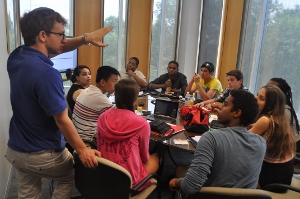This summer, nearly 100 Philadelphia-area high school students took part in the Annenberg Public Policy Center’s inaugural summer camp program devoted to learning about and participating in anti-tobacco advertising research. The program, dubbed M.E.D.I.A. – for Motivating, Educating, Directing and Informing Teens about Research – brought teenagers from 19 area schools to APPC over three week-long sessions. During the program, funded in part by a federal grant to the University of Pennsylvania to study tobacco use and regulation, the participants worked in groups instructed by the APPC’s staff to create their own anti-tobacco advertisements in collaboration with APPC video producers. The participants included 95 rising seniors, one rising junior and one high school graduate.

“I was interested in research, particularly helping kids learn about the negative aspects of smoking and informing them why it’s wrong from a teenage point of view,” said Germantown Friends student Annie Block, 17, who attended the third week. She was impressed by the quality of the videos directed by the students from earlier weeks, not only for their informational content, but also for their original visual approaches. The videos incorporate pop culture references and viral clips from the Internet with information from health organizations like the Centers for Disease Control and the National Institutes of Health (NIH) to debunk the misinformation spread by pro-tobacco YouTube personalities.
For some students, like Little Flower Catholic High School senior Briana Torres, 17, the camp was also an opportunity to make a difference on a personal level. “They said it would be tobacco-related, and since I have an uncle who smokes and it’s a really bad habit, I figured I might learn something to pass on to him,” she said. Torres, like many students in the camp, is interested in pursuing a career in healthcare, but she says that the camp is relevant for students with a wide range of interests.
August Dichter, a student at Friends Select School in Philadelphia, 17, took time off from his job teaching math at a summer camp to participate, persuaded by friends as well as by an interest in making his own advertisements. “I’ve learned more about the process of effective advertising, which is a really cool idea… I always expected to enjoy it, because I’m always like, I could definitely make an ad, but it was really difficult and I really liked it.”
At the end of each week, the students screened their finished videos for the other groups and APPC staff, and gave brief presentations explaining the process they took to develop their videos. The videos impressed not only as products of the students’ creative ingenuity, but also as the effective application of the theoretical tools taught to them by the APPC’s researchers. Camp director and APPC research coordinator Mykel Matthews said, “We learned a lot more from the students than I anticipated.”
APPC senior researcher Bruce Hardy said the camp has been a huge success. “A main focus area of APPC is identifying and debunking misleading and inaccurate claims that are found in public discourse, and the Annenberg M.E.D.I.A. summer camp falls right in line with that mission,” he said. He explained that the camp has met all of its goals: teaching students social science research methods, exposing them to the theories underlying the anti-tobacco messages produced by the APPC, using the students’ input to make messaging more effective, and producing the student-directed anti-tobacco messages.
“Most importantly, the students really enjoyed the camp and both the students and APPC staff benefited greatly from the experience,” Hardy said. “We hope to have continued success in the following summers.”
The program was funded in part by the NIH and the Food and Drug Administration, which last fall awarded the University of Pennsylvania a five-year, $20 million grant to establish a Tobacco Center of Regulatory Science. The center is devoted to studies to inform the regulation of tobacco products to protect public health.

